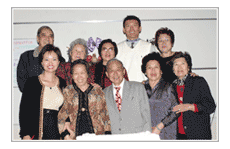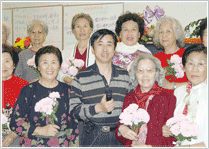SunnyDay Aging Foundation (SAF)
10530 Lower Azusa Rd., El Monte, CA 91731
Tel: 626-350-3886, Fax: 626-444-2747
 According to the 2000 census, the aging population had reached 12% of the According to the 2000 census, the aging population had reached 12% of the
United States¡¯ population, and 9.7% of the California population. More than 50%
of the aging California population lives in Southern California, amongst them more than 140 thousand elderly Asians. The average age of the Asian elders is 82.9.
They are the longest living minority elderly group in the United States. The census
also predicts that by the year of 2025, the elderly population over 65 years old will increase 80% over the 2000 figure. This rate of increase far exceeds the growth
rate of 15% of the normal population. Elderly related problems will become the
most important social topics in Southern California, California, and the entire
United States.
Beginning of Establishment
SunnyDay Adult Day Health Care and SunnyDay Asian Service on Aging Association were established in September, 1999. These two centers have put forth over 5 years of work in elderly care, specializing in Asian Pacific Islander elders¡¯ living adjustment, psychological counseling, medical care, and safety, family, social related topics. The center has accumulated great deal of experiences and won much praise and many awards from the communities around. SunnyDay has helped many elders regain their happiness; reconfirm their self worth, and relief elders¡¯ family burden. The center helped to improve the social harmony, and provided services far exceeding other similar centers. SunnyDay had established a great social figure for the community and became an icon for elderly care. In order to service a wider population and increase elderly care education, SunnyDay Adult Day Health Care established the SunnyDay Foundation in 2000.
Purpose of Establishment
Cultivate a healthy, wonderful and meaning life for the elders,
while improving elderly benefits and care.
Work Goals
 • Through education and increase contacts, aim to help Southern California¡¯s minority elder populations to accept more social and public benefits, in order to decrease their poverty level. • Through education and increase contacts, aim to help Southern California¡¯s minority elder populations to accept more social and public benefits, in order to decrease their poverty level.
• Increase minority elders¡¯ social status by improving their language education, and decreasing their poverty level.
• Help elders to regain their self confidence and capacity in self care.
• Through increasing education and public relationships, SunnyDay aims to urge the society and communities to emphasize elderly care and pay special attention to elderly problems, increase volunteerism, and improve social and family harmony.
Main Focus of SunnyDay
Several federal and state programs help elderly people with limited income pay for basic living expenses, medical care, and food. However, the number of elderly people who are actually enrolled in these important programs falls far short of the number of those who qualify. SASAA reaches, educates and directs low-income individuals who can benefit from programs that ease the burden of poverty.
These programs include: SSI (Supplemental Security Income), Medicaids, Food Stamps, QMB (Qualified Medicare Beneficiary), SLMB (Specified Low-income Medicare Beneficiary), Meals on Wheel, Senior Living, Nursing home, Adult Day Care program and other accessible programs.
How we educate¡
Although age is sometimes called the great equalizer, today's elderly is a highly diverse group. Differences in income, health and social supports significantly affect their quality of life. An important aspect of diversity is ethnicity. The status and resources of many minority elderly reflect social and economic discrimination experienced earlier in life. Many, especially those who have migrated to the U.S., face cultural and language differences as well. Consequently, minority groups in the U.S. have increased risks of poor education, substandard housing, poverty, malnutrition, and generally poor health. SASAA aimed at reduce the poverty burden of minority elderly and will educate members to live up to their living standard.
These programs include:
• SASAA Senior Community Service Employment Program (SCSEP) is a work training program for low income persons age 55 and older. This program helps participants gain the skills and paid work experience to transition into permanent, unsubsidized jobs. Once enrolled, each receive a temporary assignment, job search assistance, and skills training as needed. The program offers enrollees a chance to earn an income, develop new skills, and serve their community ¨C while continuing to pursue a permanent job.
• SASAA Legal training Project (LTP). The mission of the Legal Training Project has been to protect the legal rights of minority elderly by providing training and technical assistance to lawyers, paralegals, law advocates and volunteers, who in turn offer free legal assistance to older individuals. The topics could be: SSI, Nursing Home Law, Medicare, Food Stamps, Protective Services Law, Social Security Disability and Retirement, American with Disabilities Act, and Guardianship.
• SASAA Phone Center Program (PCP) aims to provide convenient telephone referral services to members. PCP will cover Consultation Services, Financial and Legal Services, Health and Medical Services, Insurance and Travel Safety Services and related issues.
How we promote¡
- Conducting various minority elderly care presentations, including immigration and living adjustment, family relationship, and spousal death issues. The goal is to educate the elders, and create a more interesting living condition for them.
- Focus on minority elderly cares, and increase the awareness of elderly problems in communities.
- Conducting elderly health education and safe concerns presentation, helping elders to lead a healthy life.
- Present health topics on Alzheimer¡¯s disease, dementia, chronic diseases, and provide consultation on cares of these diseases.
- Promote volunteerism of the young generations, aid elders in applying for social and welfare benefits.
- Promote society¡¯s concerns for elderly welfare and increasing respect for the elders.
- Provide language and cultural education for elders, and narrow the immigrants¡¯ gaps with the mainstream culture.
- Provide various interesting and beneficial activities for elders, allow them to learn new knowledge and courses, regain their confidence and happiness.
- Gather social welfare benefits and resources, establishing elderly care in a systematic fashion.
- Conduct various events and activities that are beneficial to the communities.
SunnyDay Adult Day Health Care¡¯s Main Board Members
President Ms. Daly Chin
SunnyDay Elderly Community College Principal Mr. Jeffrey Tung
Honorary Principle of SunnyDay ECC Mr. Kaofang Yeh, PhD
SunnyDay Chinese Elderly Care Service Center President Ms. Daly Chin
SunnyDay Elderly Community College Main Consultant Ms. Wanny Chang
Head Consultant Ms. Grace Chang
Honorary Consultants Ms. Marina Tse
Mr. Judy Coffman
Mr. Chris Ho
Ms. Loretta Hung, PhD
|